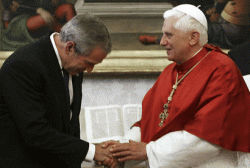Debate Bush and the Pope on Cuba embargo
- Submitted by: admin
- Destinations
- Europe
- history
- international
- North America
- personalities
- Society
- United States
- Politics and Government
- 04 / 17 / 2008

The economic sanctions were "oppressive, unjust and ethically unacceptable," John Paul told President Bill Clinton back then.
Today, with a different U.S. President and a new Pope, those sanctions are still in place, and very little has changed in Washington's policy toward Cuba. In fact, even stronger economic measures exist now, and Benedict, who is visiting the U.S. for the first time, is expected to raise the issue again with President Bush.
"Oppressive, unjust and ethically unacceptable." John Paul's words were as accurate in defining the moral dimension of the mistreatment of undocumented workers and their families as they were in describing the Cuban embargo.
Immigration is another uncomfortable issue the pontiff will be bringing to the attention of Bush and the U.S. It has been reported that Pope Benedict is particularly concerned about immigrant families being torn apart by raids and deportations.
"The millions of immigrant workers who pick our food, take care of our children and elderly, and in thousands of other ways greatly contribute to our economy deserve better treatment," said Héctor Figueroa, secretary treasurer of the Service Employees International Union's Local 32BJ, which represents more than 85,000 property service workers.
The Catholic Church, with its long tradition of immigrant advocacy, also is a strong supporter of better treatment for the undocumented. Actually, the U.S. Conference of Catholic Bishops favors comprehensive immigration reform, including the legalization of the estimated 12 million undocumented immigrants already living in the U.S.
At a time when the Catholic Church in the U.S., hit by the biggest sexual scandal in its history, has seen a massive exodus from its ranks, immigrants have served as a counterbalance to keep the number of Catholics from dropping even more dramatically.
Even though there are 64 million Catholics in the U.S., according to the Pew Forum on Religion and Public Life, the Catholic Church is losing more people every year than any other religion in the country.
Still, the Catholic share of the country's population remains basically stable due to the large number of immigrants, especially from Latin America, who embrace Catholicism. And they have faith that the Pope's visit will help to normalize their situation.
"I think His Holiness will make a difference," said Enid Ramírez, 35, a Guatemalan undocumented immigrant who works as a house cleaner. She also is a devout Catholic.
"I don't have papers, but I have two children, 10 and 8, and I need to work to support them," she said. I'm praying for the Pope and for my family and for all immigrants."
Pope John Paul's call for a more humane policy toward Cuba has gone unheeded for more than a decade. Beyond the celebrations and photo ops in an election year, let's hope that Pope Benedict's moral positions and ideas are given the importance they deserve.
(N.Y.Daily News)
Today, with a different U.S. President and a new Pope, those sanctions are still in place, and very little has changed in Washington's policy toward Cuba. In fact, even stronger economic measures exist now, and Benedict, who is visiting the U.S. for the first time, is expected to raise the issue again with President Bush.
"Oppressive, unjust and ethically unacceptable." John Paul's words were as accurate in defining the moral dimension of the mistreatment of undocumented workers and their families as they were in describing the Cuban embargo.
Immigration is another uncomfortable issue the pontiff will be bringing to the attention of Bush and the U.S. It has been reported that Pope Benedict is particularly concerned about immigrant families being torn apart by raids and deportations.
"The millions of immigrant workers who pick our food, take care of our children and elderly, and in thousands of other ways greatly contribute to our economy deserve better treatment," said Héctor Figueroa, secretary treasurer of the Service Employees International Union's Local 32BJ, which represents more than 85,000 property service workers.
The Catholic Church, with its long tradition of immigrant advocacy, also is a strong supporter of better treatment for the undocumented. Actually, the U.S. Conference of Catholic Bishops favors comprehensive immigration reform, including the legalization of the estimated 12 million undocumented immigrants already living in the U.S.
At a time when the Catholic Church in the U.S., hit by the biggest sexual scandal in its history, has seen a massive exodus from its ranks, immigrants have served as a counterbalance to keep the number of Catholics from dropping even more dramatically.
Even though there are 64 million Catholics in the U.S., according to the Pew Forum on Religion and Public Life, the Catholic Church is losing more people every year than any other religion in the country.
Still, the Catholic share of the country's population remains basically stable due to the large number of immigrants, especially from Latin America, who embrace Catholicism. And they have faith that the Pope's visit will help to normalize their situation.
"I think His Holiness will make a difference," said Enid Ramírez, 35, a Guatemalan undocumented immigrant who works as a house cleaner. She also is a devout Catholic.
"I don't have papers, but I have two children, 10 and 8, and I need to work to support them," she said. I'm praying for the Pope and for my family and for all immigrants."
Pope John Paul's call for a more humane policy toward Cuba has gone unheeded for more than a decade. Beyond the celebrations and photo ops in an election year, let's hope that Pope Benedict's moral positions and ideas are given the importance they deserve.
(N.Y.Daily News)
Comments